2019高考英语听力专项练习(31)(7)
2019年高考全国Ⅰ卷英语试题(含听力音频、听力原文和答案)

绝密★启用前2019年普通高等学校招生全国统一考试英语Ⅰ卷(2019)英语听力音频 双击图标打开收听.mp4适用地区:河北、河南、山西、山东、江西、安徽、湖北、湖南、广东、福建注意事项:1.答卷前,考生务必将自己的姓名、考生号等填写在答题卡和试卷指定位置上。
2.回答选择题时,选出每小题答案后,用铅笔把答题卡上对应题目的答案标号涂黑。
如需改动,用橡皮擦干净后,再选涂其他答案标号。
回答非选择题时,将答案写在答题卡上,写在本试卷上无效。
3.考试结束后,将本试卷和答题卡一并交回。
第一部分听力(共两节,满分30分)做题时,先将答案标在试卷上。
录音内容结束后,你将有两分钟的时间将试卷上的答案转涂到答题卡上。
第一节(共5小题;每小题1.5分,满分7.5分)听下面5段对话。
每段对话后有一个小题,从题中所给的A、B、C三个选项中选出最佳选项。
听完每段对话后,你都有10秒钟的时间来回答有关小题和阅读下一小题。
每段对话仅读一遍。
例:How much is the shirt?A. £19.15.B. £9.18.C. £9.15.答案是C。
1.Where does this conversation take place?A. In a classroom.B. In a hospital.C. In a museum. 2.What does Jack want to do?A. Take fitness classes.B. Buy a pair of gym shoes.C. Change his work schedule.3.What are the speakers talking about?A. What to drink.B. Where to meet.C. When to leave.4.What is the relationship between the speakers?A. Colleagues.B. Classmates.C. Strangers.5.Why is Emily mentioned in the conversation?A. She might want a ticket.B. She is looking for the man.C. She has an extra ticket.第二节(共15小题;每小题1.5分,满分22.5分)听下面5段对话或独白。
2019年全国高考英语听力试题、原文及答案

2019年全国高考英语听力试题、原文及答案参考答案英语听力(每题1.5分,满分30分)第一节1. What does the man want to do?A. Take photos.B. Buy a camera.C. Help the woman.2. What are the speakers talking about?A. A noisy night.B. Their life in town.C. A place of living.3. Where is the man now?A. On his way.B. In a restaurant.C. At home4. What will Celia do?A. Find a player.B. Watch a game.C. Play basketball.5. What day is it when the conversation takes place?A. Saturday.B. Sunday.C. Monday.第二节听第6段材料,回答6、7题。
6. What is Sara going to do?A. Buy John a gift.B. Give John a surprise.C. Invite John to France.7. What does the man think of Sara’s plan?A. Funny.B. Exciting.C. Strange.听第7段材料,回答第8、9题。
8. Why does Diana say sorry to peter?A. She has to give up her travel pan.B. She wants to visit another city.C. She needs to put off her test.9. What does Diana want Peter to do?A. Help her with her study.B. Take a book to her friend.C.T eacha geography lesson.听第8段材料,回答第10至12题。
2019高考全国三卷英语听力试题原文答案

2019高考全国三卷英语听力试题原文答案全国卷III(云南、广西、贵州、四川、西藏)。
全国卷III(云南、广西、贵州、四川、西藏)。
全国卷III(云南、广西、贵州、四川、西藏)。
全国卷III(云南、广西、贵州、四川、西藏)。
第一节(共5小题;每小题1.5分,满分7.5分)听下面5段对话。
每段对话后有一个小题,从题中所给的A、B、C三个选项中选出最佳选项。
听完每段对话后,你都有10秒钟的时间来回答有关小题和阅读下一小题。
每段对话仅读一遍。
1. Where does the conversation probably take place?A. In a library.B. In a bookstore.C. In a classroom.2. How does the woman feel now?A. Relaxed.B. Excited.C. Tired.3. How much will the man pay?A. $20.B. $80.C. $100.4. What does the man tell Jane to do?A. Postpone his appointment.B. Meet Mr. Douglas.C. Return at 3 o’clock.5. Why would David quit his job?A. To go back to school.B. To start his own firm.C. To work for his friend.第二节(共15小题;每小题1.5分,满分22.5分)听下面5段对话或独白。
每段对话或独白后有几个小题,从题中所给的A、B、C三个选项中选出最佳选项。
听每段对话或独白前,你将有时间阅读各个小题,每小题5秒钟;听完后,各小题将给出5秒钟的作答时间。
每段对话或独白读两遍。
听第6段材料,回答第6、7题。
6. What does the man want the woman to do?A. Check the cupboard.B. Clean the balcony.C. Buy an umbrella.7. What is the probable relationship between the speakers?A. Husband and wife.B. Employer and employee.C. Shop assistant and customer.听第7段材料,回答第8至10题。
2019年3月高考听力真题及答案

1. What will the woman do about the dress?A. She’ll buy it.B. She’ll return it.C. She’ll change it.2. What are the speakers talking about?A. Buying DVDs.B. Sharing DVDs.C. Borrowing DVDs.3. What did the woman think of Dan a’s speech?A. Well-prepared.B. Important.C. Boring.4. What does the man mean?A. He will carry the boxes later.B. He is unable to give help.C. He refuses to pay for boxes.5. When is Simon supposed to arrive?A. 8:10.B. 8:00.C. 7:30.听下面一段对话,回答第6和第7题。
6. Where do the speakers plan to go?A. The woman’s home.B. A museum.C. A library.7. Why does the woman want to go on Saturday afternoon?A. To sleep late in the morning.B. To enjoy nice weather.C. To avoid the crowd. 听下面一段对话,回答第8至第10题。
8. Why did the man borrow the woman’s computer last time?A. His computer was broken.B.He used it for his computer class.C. He needed it for his paper.9. Why does the woman feel happy?A. The man can lend her a computer now.B. The man will use his own computer.C. The man will study better.10. What has the man been doing with his new computer?A. Watching DVDs.B. Searching for information.C. Doing homework.听下面一段对话,回答第11至第13题。
(完整word版)2019天津市份高考英语听力真题Word版(试题及答案)
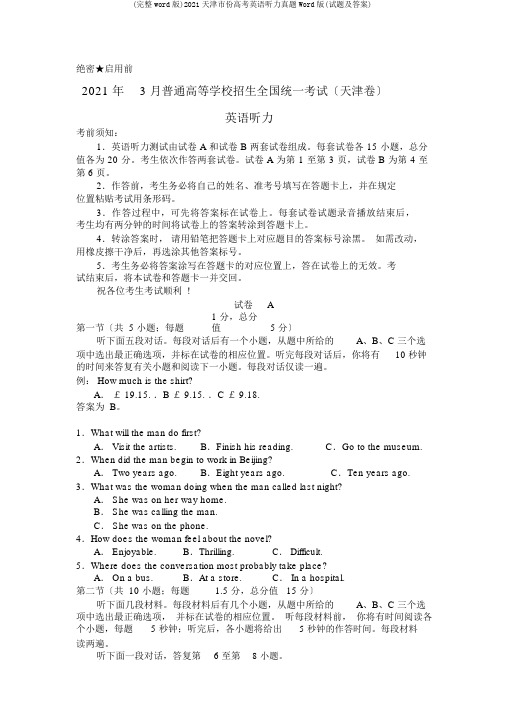
绝密★启用前2021 年 3 月普通高等学校招生全国统一考试〔天津卷〕英语听力考前须知:1.英语听力测试由试卷 A 和试卷 B 两套试卷组成。
每套试卷各 15 小题,总分值各为 20 分。
考生依次作答两套试卷。
试卷 A 为第 1 至第 3 页,试卷 B 为第 4 至第 6 页。
2.作答前,考生务必将自己的姓名、准考号填写在答题卡上,并在规定位置粘贴考试用条形码。
3.作答过程中,可先将答案标在试卷上。
每套试卷试题录音播放结束后,考生均有两分钟的时间将试卷上的答案转涂到答题卡上。
4.转涂答案时,请用铅笔把答题卡上对应题目的答案标号涂黑。
如需改动,用橡皮擦干净后,再选涂其他答案标号。
5.考生务必将答案涂写在答题卡的对应位置上,答在试卷上的无效。
考试结束后,将本试卷和答题卡一并交回。
祝各位考生考试顺利 !试卷A第一节〔共 5 小题;每题1 分,总分值 5 分〕A、B、C 三个选听下面五段对话。
每段对话后有一个小题,从题中所给的项中选出最正确选项,并标在试卷的相应位置。
听完每段对话后,你将有10 秒钟的时间来答复有关小题和阅读下一小题。
每段对话仅读一遍。
例: How much is the shirt?A.£ 19.15. .B £ 9.15. .C £ 9.18.答案为 B。
1.What will the man do first?A. Visit the artists.B.Finish his reading.C.Go to the museum. 2.When did the man begin to work in Beijing?A. Two years ago.B.Eight years ago.C.Ten years ago. 3.What was the woman doing when the man called last night?A. She was on her way home.B. She was calling the man.C. She was on the phone.4.How does the woman feel about the novel?A. Enjoyable.B.Thrilling.C. Difficult.5.Where does the conversation most probably take place?A. On a bus.B.At a store.C. In a hospital.第二节〔共 10 小题;每题 1.5 分,总分值 15 分〕听下面几段材料。
2019年高考英语试卷听力+原文+答案(新课标Ⅰ)

2019年高考英语试卷(新课标I)听力试题第一部分听力(共两节,满分30分)做题时,先将答案标在试卷上。
录音内容结束后,你将有两分钟的时间将试卷上的答案转涂到答题卡上。
第一节 (共5小题;每小题1.5分,满分7.5分)听下面5段对话。
每段对话后有一个小题,从题中所给的A、B、C三个选项中选出最佳选项。
听完每段对话后,你都有10秒钟的时间来回答有关小题和阅读下一小题。
每段对话仅读一遍。
例:How much is the shirt?A. £19.15.B. £9.18.C. £9.15.答案是C。
1.Where does this conversation take place?A. In a classroom.B. In a hospital.C. In a museum.2.What does Jack want to do?A. Take fitness classes.B. Buy a pair of gym shoes.C. Change his work schedule.3.What are the speakers talking about?A. What to drink.B. Where to meet.C. When to leave.4.What is the relationship between the speakers?A. Colleges.B. Classmates.C. Strangers.5.Why is Emily mentioned in the conversation?A.She might want a ticket.B. She is looking for the man.C. She has an extra ticket.第二节(共15小题,每小题1.5分,满分22.5分)听下面5段对话或独白。
每段对话或独白后有几个小题,从题中所给的A、B、C三个选项中选出最佳选项。
2019年高考英语全国Ⅰ卷听力试题及录音原文
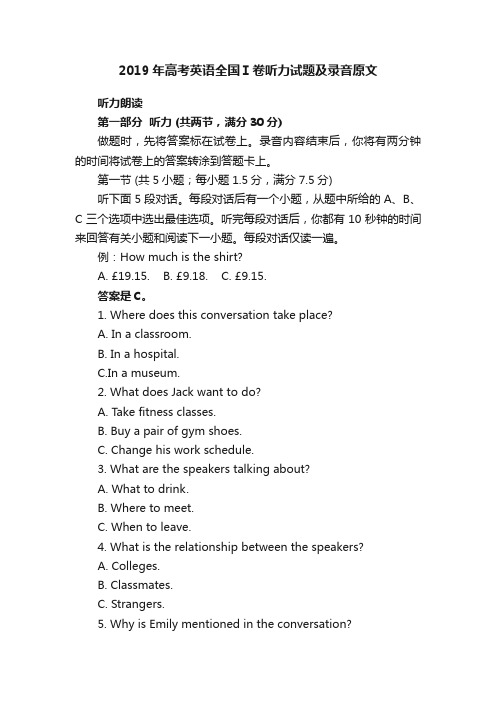
2019年高考英语全国Ⅰ卷听力试题及录音原文听力朗读第一部分听力 (共两节,满分30分)做题时,先将答案标在试卷上。
录音内容结束后,你将有两分钟的时间将试卷上的答案转涂到答题卡上。
第一节 (共5小题;每小题1.5分,满分7.5分)听下面5段对话。
每段对话后有一个小题,从题中所给的A、B、C三个选项中选出最佳选项。
听完每段对话后,你都有10秒钟的时间来回答有关小题和阅读下一小题。
每段对话仅读一遍。
例:How much is the shirt?A. £19.15.B. £9.18.C. £9.15.答案是C。
1. Where does this conversation take place?A. In a classroom.B. In a hospital.C.In a museum.2. What does Jack want to do?A. Take fitness classes.B. Buy a pair of gym shoes.C. Change his work schedule.3. What are the speakers talking about?A. What to drink.B. Where to meet.C. When to leave.4. What is the relationship between the speakers?A. Colleges.B. Classmates.C. Strangers.5. Why is Emily mentioned in the conversation?A. She might want a ticket.B. She is looking for the man.C. She has an extra ticket.第二节 (共15小题,每小题1.5分,满分22.5分)听下面5段对话或独白。
2019全国卷英语听力

2019全国卷英语听力2019年全国卷英语听力试题及答案如下:第一套听力部分第一节听下面5段对话。
每段对话后有一个小题,从题中所给的A、B、C三个选项中选出最佳选项,并标在试卷的相应位置。
听完每段对话后,你都有10秒钟的时间来回答有关小题和阅读下一小题。
每段对话仅读一遍。
1. What are the speakers talking about?A. The man's work.B. A TV program.C. The man's holiday.2. What does the man mean?A. He agrees with the woman.B. He doesn't mind the noise.C. He doesn't like the flat.3. What will the woman do?A. Help the man.B. Leave the man alone.C. Call the police.4. What does the woman mean?A. She can't meet the man.B. She doesn't want to go out.C. She has no time this evening.5. What will the speakers do?A. Go for a walk.B. Have a drink together.C. Meet at the woman's home. 第二节听下面4段对话或独白。
每段对话或独白后有几个小题,从题中所给的A、B、C三个选项中选出最佳选项,并标在试卷的相应位置。
听每段对话或独白前,你将有时间阅读各个小题,每小题5秒钟;听完后,各小题将给出5秒钟的作答时间。
每段对话或独白读两遍。
听下面一段对话,回答第6至7题。
6. What is the probable relationship between the speakers?A. Husband and wife.B. Doctor and patient.C. Teacher and student.7. What does the woman think of the weather?A. It is cold.B. It is warm.C. It is pleasant.听下面一段对话,回答第8至9题。
2019年高考全国Ⅱ卷英语试题(含听力音频、听力原文和答案)

绝密★启用前2019年普通高等学校招生全国统一考试英语Ⅱ卷(2019)英语听力音频 双击图标打开收听.mp4适用地区:内蒙古/黑龙江/辽宁/吉林/重庆/陕西/甘肃/宁夏/青海/新疆/海南注意事项:1.答卷前,考生务必将自己的姓名、考生号等填写在答题卡和试卷指定位置上。
2.回答选择题时,选出每小题答案后,用铅笔把答题卡上对应题目的答案标号涂黑。
如需改动,用橡皮擦干净后,再选涂其他答案标号。
回答非选择题时,将答案写在答题卡上,写在本试卷上无效。
3.考试结束后,将本试卷和答题卡一并交回。
第一部分听力(共两节,满分30分)做题时,先将答案标在试卷上。
录音内容结束后,你将有两分钟的时间将试卷上的答案转涂到答题卡上。
第一节(共5小题;每小题1.5分,满分7.5分)听下面5段对话。
每段对话后有一个小题,从题中所给的A、B、C三个选项中选出最佳选项。
听完每段对话后,你都有10秒钟的时间来回答有关小题和阅读下一小题。
每段对话仅读一遍。
例:How much is the shirt?A. £19.15.B. £9.18.C. £9.15.答案是C。
1.Where does the conversation probably take place?A. In a library.B. In a bookstore.C. In a classroom. 2.How does the woman feel now?A. Relaxed.B. Excited.C. Tired.3.How much will the man pay?A. $20.B. $80.C. $100.4.What does the man tell Jane to do?A. Postpone his appointment.B. Meet Mr. Douglas.C. Return at 3 o’clock. 5.Why would David quit his job?A. To go back to school.B. To start his own firm.C. To work for his friend.第二节(共15小题;每小题1.5分,满分22.5分)听下面5段对话或独白。
2019年高考英语听力真题训练 【全国卷 】
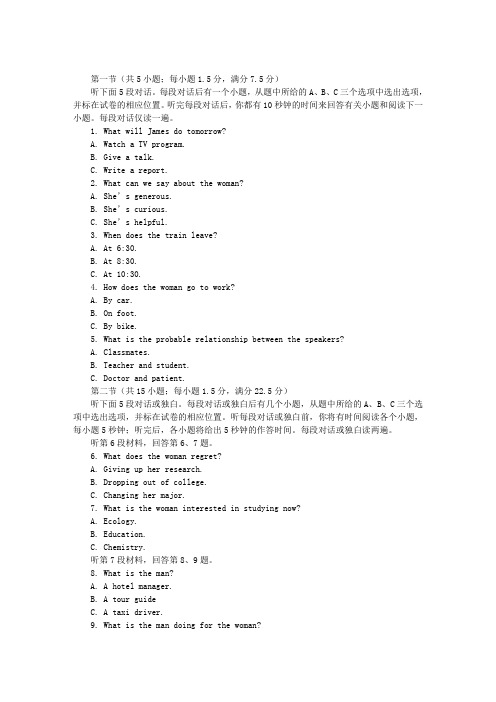
第一节(共5小题;每小题1.5分,满分7.5分)听下面5段对话。
每段对话后有一个小题,从题中所给的A、B、C三个选项中选出选项,并标在试卷的相应位置。
听完每段对话后,你都有10秒钟的时间来回答有关小题和阅读下一小题。
每段对话仅读一遍。
1. What will James do tomorrow?A. Watch a TV program.B. Give a talk.C. Write a report.2. What can we say about the woman?A. She’s generous.B. She’s curious.C. She’s helpful.3. When does the train leave?A. At 6:30.B. At 8:30.C. At 10:30.4. How does the woman go to work?A. By car.B. On foot.C. By bike.5. What is the probable relationship between the speakers?A. Classmates.B. Teacher and student.C. Doctor and patient.第二节(共15小题;每小题1.5分,满分22.5分)听下面5段对话或独白。
每段对话或独白后有几个小题,从题中所给的A、B、C三个选项中选出选项,并标在试卷的相应位置。
听每段对话或独白前,你将有时间阅读各个小题,每小题5秒钟;听完后,各小题将给出5秒钟的作答时间。
每段对话或独白读两遍。
听第6段材料,回答第6、7题。
6. What does the woman regret?A. Giving up her research.B. Dropping out of college.C. Changing her major.7. What is the woman interested in studying now?A. Ecology.B. Education.C. Chemistry.听第7段材料,回答第8、9题。
2019年高考英语听力专题训练(题目+答案+听力原文)
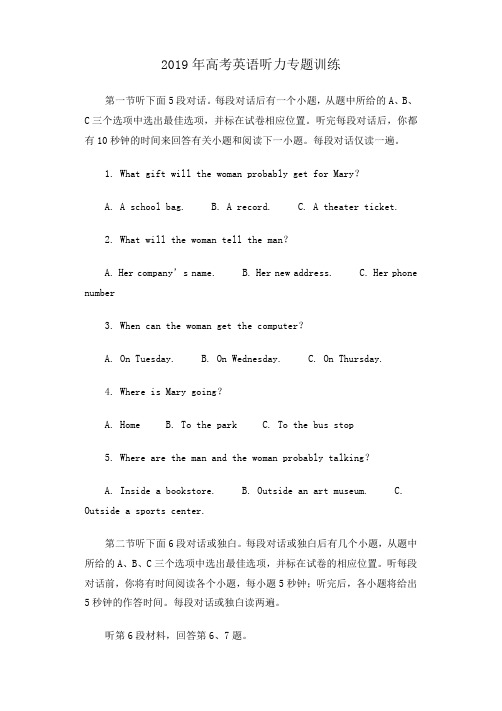
2019年高考英语听力专题训练第一节听下面5段对话。
每段对话后有一个小题,从题中所给的A、B、C三个选项中选出最佳选项,并标在试卷相应位置。
听完每段对话后,你都有10秒钟的时间来回答有关小题和阅读下一小题。
每段对话仅读一遍。
1. What gift will the woman probably get for Mary?A. A school bag.B. A record.C. A theater ticket.2. What will the woman tell the man?A. Her company’s name.B. Her new address.C. Her phone number3. When can the woman get the computer?A. On Tuesday.B. On Wednesday.C. On Thursday.4. Where is Mary going?A. HomeB. To the parkC. To the bus stop5. Where are the man and the woman probably talking?A. Inside a bookstore.B. Outside an art museum.C. Outside a sports center.第二节听下面6段对话或独白。
每段对话或独白后有几个小题,从题中所给的A、B、C三个选项中选出最佳选项,并标在试卷的相应位置。
听每段对话前,你将有时间阅读各个小题,每小题5秒钟;听完后,各小题将给出5秒钟的作答时间。
每段对话或独白读两遍。
听第6段材料,回答第6、7题。
6. What sports does the man like to play after work?A. Table tennis, running and golf.B. Tennis, jogging and golf.C. Tennis, running and golf.7. How often does the man play golf?A. About once seven days.B. About once thirty days.C. About once a year.听第7段材料,回答第8、9题。
2019年上海高考英语听力试题(含试题、录音原文和MP3)
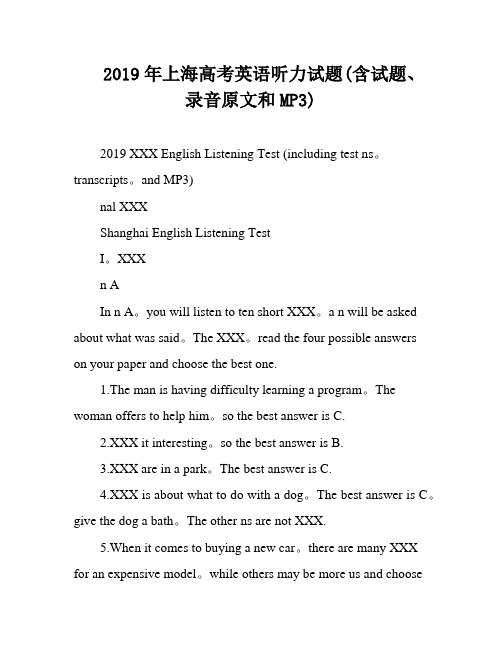
2019年上海高考英语听力试题(含试题、录音原文和MP3)2019 XXX English Listening Test (including test ns。
transcripts。
and MP3)nal XXXShanghai English Listening TestI。
XXXn AIn n A。
you will listen to ten short XXX。
a n will be asked about what was said。
The XXX。
read the four possible answerson your paper and choose the best one.1.The man is having difficulty learning a program。
The woman offers to help him。
so the best answer is C.2.XXX it interesting。
so the best answer is B.3.XXX are in a park。
The best answer is C.4.XXX is about what to do with a dog。
The best answer is C。
give the dog a bath。
The other ns are not XXX.5.When it comes to buying a new car。
there are many XXX for an expensive model。
while others may be more us and choosea cheaper n。
It's important to also consider if the car is suitable for your needs and if any extra features are necessary.6.As students。
2019年6月上海高考英语听力试题word精校版(含试题+答案+录音稿)--
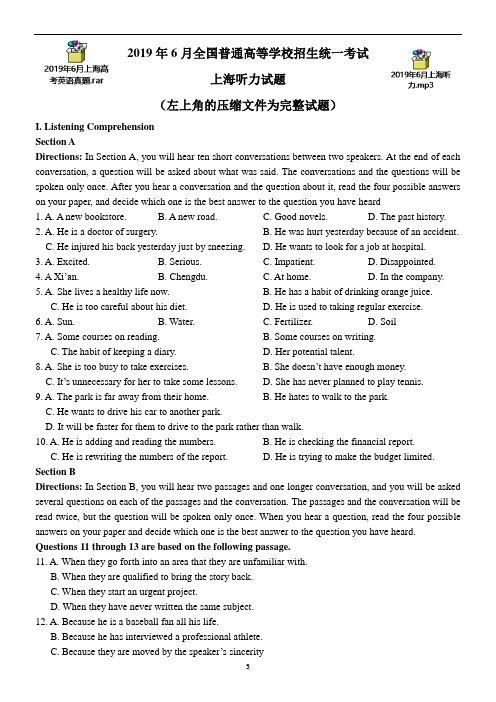
2019年6月全国普通高等学校招生统一考试上海听力试题(左上角的压缩文件为完整试题)I. Listening ComprehensionSection ADirections: In Section A, you will hear ten short conversations between two speakers. At the end of each conversation, a question will be asked about what was said. The conversations and the questions will be spoken only once. After you hear a conversation and the question about it, read the four possible answers on your paper, and decide which one is the best answer to the question you have heard1. A. A new bookstore. B. A new road. C. Good novels. D. The past history.2. A. He is a doctor of surgery. B. He was hurt yesterday because of an accident.C. He injured his back yesterday just by sneezing.D. He wants to look for a job at hospital.3. A. Excited. B. Serious. C. Impatient. D. Disappointed.4. A Xi’an. B. Chengdu. C. At home. D. In the company.5. A. She lives a healthy life now. B. He has a habit of drinking orange juice.C. He is too careful about his diet.D. He is used to taking regular exercise.6. A. Sun. B. Water. C. Fertilizer. D. Soil7. A. Some courses on reading. B. Some courses on writing.C. The habit of keeping a diary.D. Her potential talent.8. A. She is too busy to take exercises. B. She doesn’t have enough money.C. It’s unnecessary for her to take some lessons.D. She has never planned to play tennis.9. A. The park is far away from their home. B. He hates to walk to the park.C. He wants to drive his car to another park.D. It will be faster for them to drive to the park rather than walk.10. A. He is adding and reading the numbers. B. He is checking the financial report.C. He is rewriting the numbers of the report.D. He is trying to make the budget limited. Section BDirections: In Section B, you will hear two passages and one longer conversation, and you will be asked several questions on each of the passages and the conversation. The passages and the conversation will be read twice, but the question will be spoken only once. When you hear a question, read the four possible answers on your paper and decide which one is the best answer to the question you have heard. Questions 11 through 13 are based on the following passage.11. A. When they go forth into an area that they are unfamiliar with.B. When they are qualified to bring the story back.C. When they start an urgent project.D. When they have never written the same subject.12. A. Because he is a baseball fan all his life.B. Because he has interviewed a professional athlete.C. Because they are moved by the speaker’s sincerityD. Because the speaker has done some sports reporting before.13. A. Broaden the story with their own strength. B. Grow up happily and luckily.C. Get some unexpected results.D. Become a productive writer.Questions 14 through 16 are based on the following passage.14. A. Creativity is production of something original and useful.B. Creativity happens on the right side of the brain.C. Creativity is related to the freedom from concrete facts.D. Everyone has his special creativity.15. A. By focusing on obvious facts and familiar solutions to see if the answer lies there.B. By scanning remote memories that could be vaguely relevant.C. By focusing our attention to search for a wide range of distant information.D. By cutting off the connection it may have with the problem before it escapes.16. A. The common sense about the production of creativity.B. The both sides of the brain working together to creativity.C. A sense of pleasure produced by the creativity.D. How difficult that we come up with a new single idea.Questions 17 through 20 are based on the following conversation.17. A. Their plan for the summer vacation. B. The woman’s new job.C. Peter’s experience of volunteer.D. The spirit of activities.18. A. Supervising a volunteer program in a non-profit art gallery.B. Cleaning up the gallery every weekend.C. Donating cash and other things.D. Offering some part-time jobs to the young.19. A. Taking part in activities that are respected.B. Taking part in activities that are creative.C. Taking part in activities you show enthusiasm for.D. Taking part in activities you’re responsible for.20. A. Fund. B. Persistence. C. Acknowledgement. D. Respect.1-5 ACCBA 6-10 CCADA 11-15 ACABA 16-20 BCACB2019年6月上海市高考英语听力录音稿I. Listening ComprehensionSection ADirections: In Section A, you will hear ten short conversations between two speakers. At the end of each conversation, a question will be asked about what was said. The conversations and the questions will be spoken only once. After you hear a conversation and a question about it, read the four possible answers on your paper, and decide which one is the best answer to the question you have heard.1. M: Is there a new bookstore on Fuzhou Road?W: Yes, it’s got very good novels of the 20th century.Q: What are the speakers mainly talking about?2. W: Mike, are you OK?M: I injured my back yesterday just by sneezing. My doctor said I need surgeryQ: What can be learned about the man?3. M: Which team are you going to support?W: You’re not going to talk about football again, are you? That’s itQ: How does the woman feel about discussing footbal1?4. M: Mary is not in the company. Has she returned from Xi’an yet?W: Yes. But before she went to Chengdu yesterday, she had been home for only one day.Q: Where is Mary Now?5. M: What? Steven is drinking orange juice.W: You cannot believe it. Now, he’s careful about what he eats and takes regular exercise.Q: What does the woman imply about Steven?6. M: I’ve moved the flower into the garden and watered it every day. How come it is still not doing well? W: Well, why not add some fertilizer? M aybe that’ll helpQ: According to the woman, what may the flower need?7. M: Wow, you won the first prize in the writing contest. You haven’t taken any courses on reading and writing.W: But I’ve been keeping a diary since childhood.Q: According to the woman, what helped her win the contest?8. M: You like tennis so much. Why not take some lessons? They start next weekW: How am I going to fit that into my crowded schedule?Q: What does the woman mean?9. W: Walk to the park? You must be kidding! It takes only five minutes to drive there.M: If I had remembered to charge my carQ: What can be learned about the man?10. W: You’ve been dealing with that budget report for nearly an hour. Anything wrong?M: I keep adding and reading the numbers, but they just don’t balance.Q: What is the man doing?Section BDirections: In Section B, you will hear two passages and one longer conversation, and you will be asked several questions on each of the passages and the conversation. The passages and the conversation will be read twice, but the questions will be spoken only once. When you hear a question, read the four possible answers on your paper and decide which one is the best answer to the question you have heard. Questions 11 through 13 are based on the following passage.It’s common for you, nonfiction writers, to go forth i nto an area you know little about. You may worry that you are not qualified to bring the story back. I feel that anxiety every time I start a new project. I felt it when I went to Bradenton to write my baseball book Spring training. Although I’ve been a ba seball fan all my life, I had never done any sports reporting, never interviewed a professional athlete. Any of the men I approached with a notebook could have asked. What else have you written about baseball? But nobody did.They didn’t ask, because I was sincere. It was obvious to those man that I really wanted to know how they did their work. Remember this. when you enter a new area and need a shot of confidence, whatmatters is how you do it. Also remember that your assignment may not be as narrow as you think. Often it will turn out to touch some unexpected corner of your experience or your education, enabling you to broaden the story with strength of your own. Every such production of the unfamiliar will reduce your fear.Questions:11. According to the speaker, when may non-fiction writers feel worried?12. Why didn’t nobody in Bradenton care about what the speaker had written before?13. According to the speaker, how does non-fiction writers’ experience or education benefit them? Questions 14 through 16 are based on the following talkThe accepted definition of creativity is production of something original and useful, and it is commonly thought that creativity occurs on the right side of the brain, and the arts play an important role in enhancing it. But according to a new research, creativity isn’t about freedom from concrete facts. Rather, fact-finding is vital in the creative process. It’s the result of both sides of your brain working together. To understand this. we need to take a look at what leads to creativity. When you try to solve a problem, you begin by concentrating on obvious facts and familiar solutions to see if the answer lies there. This is done mostly by the left side However, if the answer doesn’t come, the right and left sides of the brain activate together. The right side scans remote memories that could be vaguely relevantA wide range of distant information that is normally ignored becomes available to the left side. Then the left side catches whatever connection it may have with the problem. and quickly locks in on it before it escapes. With extremely focused attention, the brain quickly pulls together these pieces of thought and combines them into a new single idea, as the brain recognizes the originality of what it has come up with.a sense of pleasure will arise.Questions14. What do people commonly think of creativity?15. According to the passage, how does the left side of the brain contribute to creative process?16. What is the passage mainly about?Questions 17 through 20 are based on the following conversation.W: Hello. Peter. I heard you worked in a remote village last monthM: Yes, as a volunteer teaching in a primary school in southeastern China.W: A good choice for the summer vacationM: For me, it’s not only a choice, but a responsibility.W: You’re right. What can a volunteer generally do?M: Many things, like creating a change in the surroundings, providing shelter and food to the needy ones. W: So you mean volunteering is not just donating cash or things?M: Right! We prefer to call that charityW: How did you come up with the idea of volunteering?M: It was my father. He used to supervise a volunteer program in a non-profit art gallery.W. Was it a full-time job for him?M: No, in fact. a part-time job. He went to the gallery nearly every weekend.W: Wow, this requires great passionM: Sure. The best way to volunteer is to get involved in activities we are passionate aboutW: Have you had any difficulties as a volunteer?M: Definitely! Lack of respect, acknowledgement, and lack of funds now and then W: Oh, my! Many obstacles!M: So the most important spirit is perseveranceW: I’d like to join you someday.M: Any time.Questions17. What are the two speakers mainly talking about?18. What vo lunteer service did the man’s father do?19. What does the man think is the best way to volunteer?20. According to the man, which of the following is the most important for a volunteer?。
2019年天津高考英语听力试题及原文
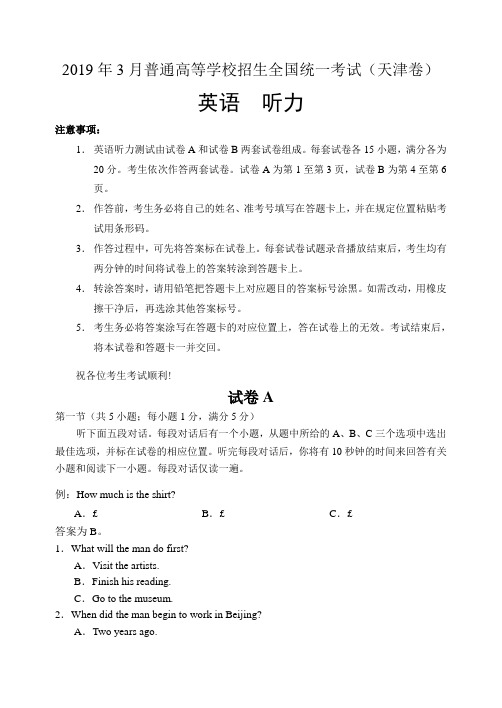
2019年3月普通高等学校招生全国统一考试(天津卷)英语听力注意事项:1.英语听力测试由试卷A和试卷B两套试卷组成。
每套试卷各15小题,满分各为20分。
考生依次作答两套试卷。
试卷A为第1至第3页,试卷B为第4至第6页。
2.作答前,考生务必将自己的姓名、准考号填写在答题卡上,并在规定位置粘贴考试用条形码。
3.作答过程中,可先将答案标在试卷上。
每套试卷试题录音播放结束后,考生均有两分钟的时间将试卷上的答案转涂到答题卡上。
4.转涂答案时,请用铅笔把答题卡上对应题目的答案标号涂黑。
如需改动,用橡皮擦干净后,再选涂其他答案标号。
5.考生务必将答案涂写在答题卡的对应位置上,答在试卷上的无效。
考试结束后,将本试卷和答题卡一并交回。
祝各位考生考试顺利!试卷A第一节(共5小题;每小题1分,满分5分)听下面五段对话。
每段对话后有一个小题,从题中所给的A、B、C三个选项中选出最佳选项,并标在试卷的相应位置。
听完每段对话后,你将有10秒钟的时间来回答有关小题和阅读下一小题。
每段对话仅读一遍。
例:How much is the shirt?A.£B.£C.£答案为B。
1.What will the man do first?A.Visit the artists.B.Finish his reading.C.Go to the museum.2.When did the man begin to work in Beijing?A.Two years ago.B.Eight years ago.C.Ten years ago.3.What was the woman doing when the man called last night?A.She was on her way home.B.She was calling the man.C.She was on the phone.4.How does the woman feel about the novel?A.Enjoyable.B.Thrilling.C.Difficult.5.Where does the conversation most probably take place?A.On a bus.B.At a store.C.In a hospital.听下面几段材料。
2019年高考英语听力真题(全国卷)
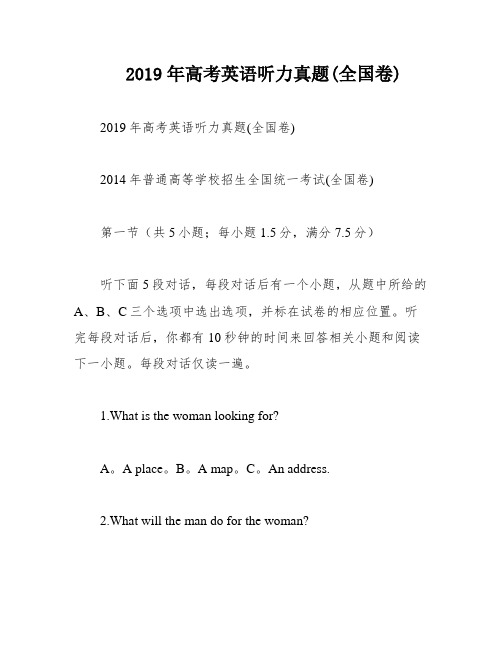
2019年高考英语听力真题(全国卷)2019年高考英语听力真题(全国卷)2014年普通高等学校招生全国统一考试(全国卷)第一节(共5小题;每小题1.5分,满分7.5分)听下面5段对话,每段对话后有一个小题,从题中所给的A、B、C三个选项中选出选项,并标在试卷的相应位置。
听完每段对话后,你都有10秒钟的时间来回答相关小题和阅读下一小题。
每段对话仅读一遍。
1.What is the woman looking for?A。
A place。
B。
A map。
C。
An address.2.What will the man do for the woman?A。
Repair her car。
B。
Give her a ride。
C。
Pick up her aunt.3.Who might Mr。
Peterson be?XXX.4.What does the man think of the book?A。
XXX.5.What are the XXX?A。
XXX.第二节(共15小题;每小题1.5分,满分22.5分)听下面5段对话或独白。
每段对话或独白后有几个小题,从题中所给的A、B、C三个选项中选出选项,并标在试卷的相应位置。
听每段对话或独白前,你将有时间阅读各个小题,每小题5秒钟;听完后,各小题给出5秒钟的作答时间。
每段对话或独白读两遍。
听第6段材料,回答第6、7题。
6.Why is Harry unwilling to join the woman?A。
He has a pain in his knee.B。
He wants to watch TV.C。
He is too lazy.7.What will the woman probably do next?A。
Stay at home.B。
Take Harry to the hospital.C。
Do some exercise.18.What is the XXX of living in a big city according to the speaker?A。
一九年高考英语试卷
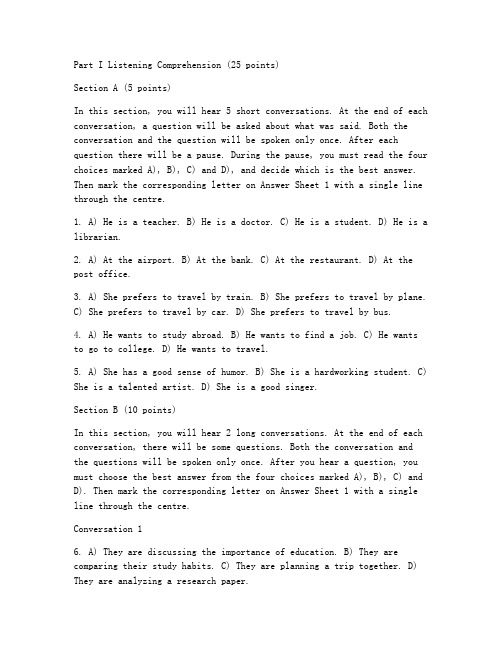
Part I Listening Comprehension (25 points)Section A (5 points)In this section, you will hear 5 short conversations. At the end of each conversation, a question will be asked about what was said. Both the conversation and the question will be spoken only once. After each question there will be a pause. During the pause, you must read the four choices marked A), B), C) and D), and decide which is the best answer. Then mark the corresponding letter on Answer Sheet 1 with a single line through the centre.1. A) He is a teacher. B) He is a doctor. C) He is a student. D) He is a librarian.2. A) At the airport. B) At the bank. C) At the restaurant. D) At the post office.3. A) She prefers to travel by train. B) She prefers to travel by plane.C) She prefers to travel by car. D) She prefers to travel by bus.4. A) He wants to study abroad. B) He wants to find a job. C) He wants to go to college. D) He wants to travel.5. A) She has a good sense of humor. B) She is a hardworking student. C) She is a talented artist. D) She is a good singer.Section B (10 points)In this section, you will hear 2 long conversations. At the end of each conversation, there will be some questions. Both the conversation and the questions will be spoken only once. After you hear a question, you must choose the best answer from the four choices marked A), B), C) and D). Then mark the corresponding letter on Answer Sheet 1 with a single line through the centre.Conversation 16. A) They are discussing the importance of education. B) They are comparing their study habits. C) They are planning a trip together. D) They are analyzing a research paper.7. A) She has always been a top student. B) She is currently studyingfor her college entrance exam. C) She plans to major in engineering. D) She enjoys reading books on various subjects.8. A) He has a good memory. B) He is a good speaker. C) He is a creative writer. D) He is a talented musician.Conversation 29. A) They are discussing the best place to go for a vacation. B) They are planning a road trip. C) They are comparing their travel experiences.D) They are talking about the advantages of traveling.10. A) The beach. B) The mountains. C) The city. D) The countryside.Section C (10 points)In this section, you will hear a passage three times. When the passageis read for the first time, you should listen carefully for general ideas. When the passage is read for the second time, you are required to fill in the blanks with the exact words you have just heard. For blanks 11-13, you can choose from the words given in the box and write them on Answer Sheet 1. For blanks 14-16, you are required to fill in themissing information. You can use the exact words you have just heard or write down the main points in your own words. Remember to write the answers accordingly.The first day of high school can be an exciting but also intimidating experience. It's the beginning of a new chapter in your life, and you may feel a mix of excitement, nervousness, and curiosity. To help you make the most of this day, here are some tips:[11] ___________First, arrive early to familiarize yourself with the school's layout. This will help you feel more comfortable when you need to find your way around. Don't be afraid to ask for directions if you get lost.[12] ___________Next, be open and friendly. Introduce yourself to your classmates and make an effort to smile. Building a positive relationship with your peers will make your high school experience more enjoyable.[13] ___________Lastly, take the opportunity to meet your teachers. This is a good time to introduce yourself and ask any questions you might have about the class. Being proactive will help you get the most out of your education.Remember, the first day of high school is just the beginning. Embrace the new experiences, and don't be afraid to ask for help when you need it.Part II Structure and Vocabulary (25 points)Section A (15 points)In this section, there are 15 incomplete sentences. For each sentence there are four choices marked A), B), C) and D). Choose the one that best completes the sentence. Then mark the corresponding letter on Answer Sheet 2 with a single line through the centre.14. She ________ (be) happy if she knew the truth about her friend's situation.A) would be B) is C) was D) has been15. ________ (be) on time for the meeting is very important.A) To be B) Being C) To have been D) Having been16. I ________ (be) looking forward to the vacation since I received the invitation.A) have B) had C) am D) was17. If I ________ (be) you, I would accept the job offer.A) am B) were C) had been D) will be18. ________ (not do) your homework will result in a lower grade.A) If you B) Not doing C) To not do D) Not to do19. ________ (find) the key to success is hard work and determination.A) How B) What C) Where D) When20. It is important to ________ (take) care of your health, especially when you are young.A) to take B) taking C) take D) taken21. The movie was so ________ (amuse) that I couldn't stop laughing.A) amusing B) amused C) amuse D) to amuse22. She ________ (finish) her work before she left the office.A) has B) had C) have D) had had23. ________ (be) punctual is a good habit.A) To be B) Being C) To have been D) Having been24. ________ (decide) on the best way to solve the problem is essential.A) To decide B) Deciding C) Having decided D) Decide25. ________ (watch) the news is important for keeping up with current events.A) To watch B) Watching C) Watch D) Having watchedSection B (10 points)Complete the following passage with the appropriate forms of the words in the box. Write your answers on Answer Sheet 2.26. __________ (increase) the number of students, the school has had to expand its facilities.27. __________ (recognize) as a leading expert in her field, she has received numerous awards.28. __________ (follow) the instructions carefully, you will avoid making mistakes.29. __________ (improve) the quality of life for all people, we need to work together.30. __________ (support) by her friends and family, she has overcome many challenges.Part III Reading Comprehension (40 points)Section A (20 points)Read the following passage and answer the questions that follow.The Importance of ExerciseRegular exercise is essential for maintaining good health. It has been proven to improve cardiovascular health, reduce the risk of chronic diseases, and enhance mental well-being. However, many people struggle to incorporate physical activity into their daily routines.One reason for this is a lack of time. Many individuals believe that they do not have enough time to exercise, especially if they have a busy schedule. However, it is important to remember that even short periods of exercise can have significant benefits. For example, a 30-minute walk each day can greatly improve overall health.Another barrier to regular exercise is a lack of motivation. Some people may find it difficult to stay motivated to exercise consistently. To overcome this, it is helpful to set realistic goals and track your progress. Celebrating small victories along the way can also help maintain motivation.It is also important to find activities that you enjoy. Exercise does not have to be monotonous or boring. Engaging in activities that youfind enjoyable, such as dancing, hiking, or team sports, can make it easier to stick to a regular exercise routine.In conclusion, regular exercise is crucial for maintaining good health. By setting realistic goals, finding activities you enjoy, and makingsmall changes to your daily routine, you can incorporate physical activity into your life and reap the many benefits it offers.31. What is the main purpose of the passage?A) To encourage people to exercise regularly.B) To explain the benefits of regular exercise.C) To discuss the barriers to regular exercise.D) To provide tips for overcoming barriers to exercise.32. According to the passage, what is one way to overcome the lack of time for exercise?A) To exercise for longer periods of time.B) To find activities that you enjoy.C) To set realistic goals and track progress.D) To prioritize exercise in your daily schedule.33. Why is it important to find activities that you enjoy when exercising?A) It makes exercise more enjoyable.B) It increases the likelihood of sticking to a routine.C) It improves your overall health.D) It helps you meet new friends.34. What is the author's overall conclusion about regular exercise?A) It is not as important as people think.B) It is essential for maintaining good health.C) It should be done in moderation.D) It is only beneficial for those who are already healthy.35. Which of the following is NOT mentioned in the passage as a barrier to regular exercise?A) Lack of time B) Lack of motivation C) Lack of sleep D) Lack of informationSection B (20 points)Read the following passage and answer the questions that follow.The Internet and PrivacyThe internet has revolutionized the way we communicate, access information, and conduct business. However, this digital revolution has also raised significant concerns about privacy. As more and more personal information is shared online, the risk of identity theft and other privacy breaches has increased.One of the main reasons for the increased risk of privacy breaches is the vast amount of personal information that is collected and stored online. Companies and organizations collect data about their customers for various reasons, such as improving customer service and targeting advertising. However, this data can be easily accessed by unauthorized individuals.Another concern is the lack of transparency in how personal information is used and shared. Many people are unaware of the extent to which their personal information is being collected and used by third parties. This lack of transparency makes it difficult for individuals to make informed decisions about their privacy.To protect their privacy, individuals can take several steps. First, they should be cautious about sharing personal information online. Second, they should regularly review their privacy settings on social media platforms and other websites. Third, they should be aware of the data collection practices of companies and organizations and take steps to limit the amount of personal information they provide.Governments and companies also have a responsibility to protect the privacy of their customers. This includes implementing strong dataprotection measures and being transparent about how personal information is collected and used.In conclusion, the internet has brought many benefits, but it has also raised significant concerns about privacy. By taking steps to protect their privacy and by holding companies and governments accountable, individuals can help ensure that their personal information remains secure.36. What is the main topic of the passage?A) The benefits of the internet.B) The risks of using the internet.C) The importance of privacy.D) The role of governments in protecting privacy.37. According to the passage, what is one of the main reasons for the increased risk of privacy breaches?A) The lack of transparency in data collection.B) The vast amount of personal information collected online.C) The increasing number of cyberattacks.D) The lack of awareness among internet users.38. What steps can individuals take to protect their privacy?A) They should avoid using the internet.B) They should regularly review their privacy settings.C) They should stop using social media platforms.D) They should provide more personal information to companies.39. What is the author's attitude towards the internet and privacy?A) Negative B) Positive C) Neutral D) Critical40. Which of the following is NOT mentioned in the passage as a step individuals can take to protect their privacy?A) Being cautious about sharing personal information online.B) Regularly reviewing privacy settings.C) Providing more personal information to companies.D) Being aware of data collection practices.Part IV Writing (25 points)41. Write an essay of about 150 words on the following topic:How has technology changed our lives in the past decade?Your essay should include:- The main changes brought about by technology.- The positive and negative impacts of these changes.- Your personal opinions and experiences.Write your essay on Answer Sheet 2.。
2019听力原文和答案
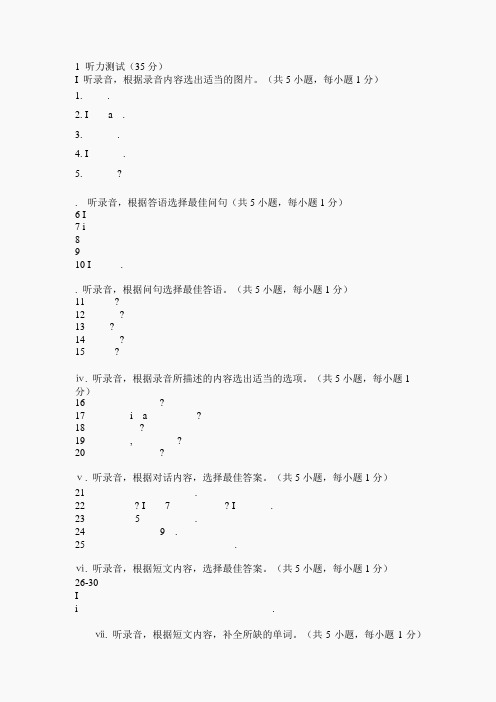
Ii .
ⅶ.听录音,根据短文内容,补全所缺的单词。(共5小题,每小题1分)
31-35
I ( ). I ( ) ( ) I ( ) a a ( ) a . I .
答案:
1-5
6-10
11-15
16 -20 21-25 26-30
31 32 33 34 35
36-40判音题:××√×√
41-50选择填空
1听力测试(35分)
I听录音,根据录音内容选出适当的图片。(共5小题,每小题1分)
1. .
2.Ia .
3. .
4.I共5小题,每小题1分)
6 I
7 i
8
9
10 I .
.听录音,根据问句选择最佳答语。(共5小题,每小题1分)
11 ?
12 ?
13 ?
14 ?
15 ?
51-55完形填空
56-60阅读理解
61-65阅读理解
66-70阅读理解
71-75情景问答
76.补全对话(1) (2) (3) (4) (5)
77.补全对话1C 2B 3D 4E 5A
78.补全对话1C 2B 3E 4D 5A
ⅳ.听录音,根据录音所描述的内容选出适当的选项。(共5小题,每小题1分)
16 ?
17i a ?
18 ?
19, ?
20?
ⅴ.听录音,根据对话内容,选择最佳答案。(共5小题,每小题1分)
21 .
22 ? I 7 ? I .
235 .
249 .
25 .
ⅵ.听录音,根据短文内容,选择最佳答案。(共5小题,每小题1分)
(全中文翻译)2019年高考英语全国III卷真题听力原文及答案完整版
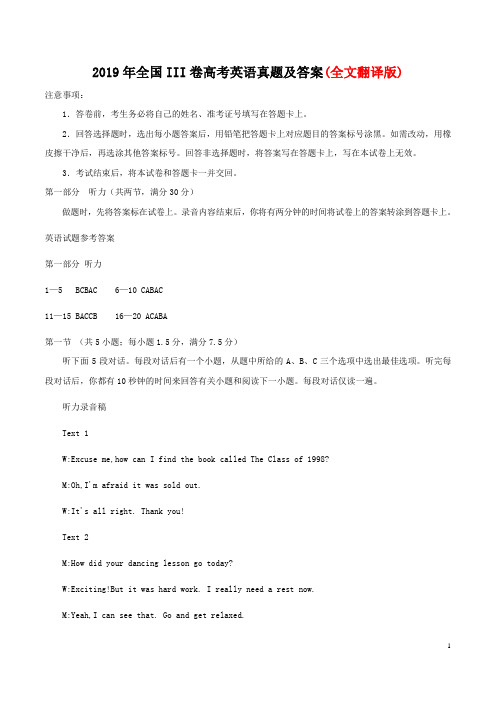
2019年全国III卷高考英语真题及答案(全文翻译版)注意事项:1.答卷前,考生务必将自己的姓名、准考证号填写在答题卡上。
2.回答选择题时,选出每小题答案后,用铅笔把答题卡上对应题目的答案标号涂黑。
如需改动,用橡皮擦干净后,再选涂其他答案标号。
回答非选择题时,将答案写在答题卡上,写在本试卷上无效。
3.考试结束后,将本试卷和答题卡一并交回。
第一部分听力(共两节,满分30分)做题时,先将答案标在试卷上。
录音内容结束后,你将有两分钟的时间将试卷上的答案转涂到答题卡上。
英语试题参考答案第一部分听力1—5 BCBAC 6—10 CABAC11—15 BACCB 16—20 ACABA第一节(共5小题;每小题1.5分,满分7.5分)听下面5段对话。
每段对话后有一个小题,从题中所给的A、B、C三个选项中选出最佳选项。
听完每段对话后,你都有10秒钟的时间来回答有关小题和阅读下一小题。
每段对话仅读一遍。
听力录音稿Text 1W:Excuse me,how can I find the book called The Class of 1998?M:Oh,I'm afraid it was sold out.W:It's all right. Thank you!Text 2M:How did your dancing lesson go today?W:Exciting!But it was hard work. I really need a rest now.M:Yeah,I can see that. Go and get relaxed.Text 3M:How much is that in total?W:$100. But if you have a membership card,I can give you a 20% discount. M:Great! This is my membership card.Text 4M:Jane,I'm going out for a while.W:But you have an appointment with Mr. Douglas at 3 o'clock.M:Well,please make it another day.Text 5W:David said he would quit his job at our school.M:Really? Why would he do that?W:His friend started a firm in London. She wanted David to help her.文字1劳:对不起,我怎么能找到《 1998年的班级》这本书?玛:哦,恐怕它已经卖完了。
2019年高考全国III卷英语听力(含听力音频、听力原文和答案)
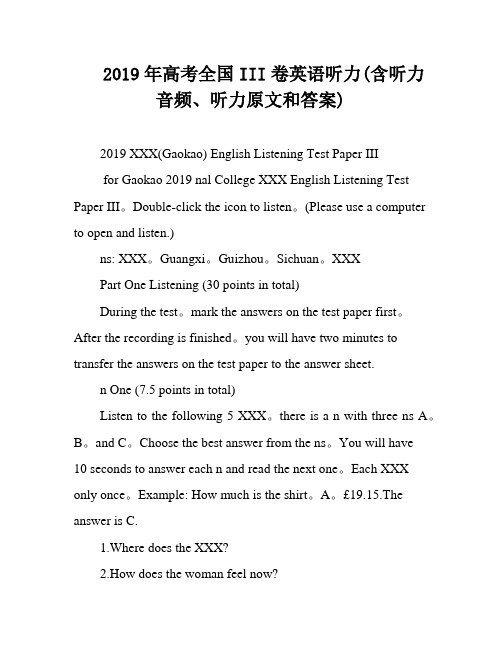
2019年高考全国III卷英语听力(含听力音频、听力原文和答案)2019 XXX(Gaokao) English Listening Test Paper IIIfor Gaokao 2019 nal College XXX English Listening Test Paper III。
Double-click the icon to listen。
(Please use a computer to open and listen.)ns: XXX。
Guangxi。
Guizhou。
Sichuan。
XXXPart One Listening (30 points in total)During the test。
mark the answers on the test paper first。
After the recording is finished。
you will have two minutes to transfer the answers on the test paper to the answer sheet.n One (7.5 points in total)Listen to the following 5 XXX。
there is a n with three ns A。
B。
and C。
Choose the best answer from the ns。
You will have10 seconds to answer each n and read the next one。
Each XXX only once。
Example: How much is the shirt。
A。
£19.15.The answer is C.1.Where does the XXX?2.How does the woman feel now?3.How much will the man pay?4.What does the man tell Jane to do?5.Why would David quit his job?n Two (22.5 points in total)Listen to the following 5 XXX。
- 1、下载文档前请自行甄别文档内容的完整性,平台不提供额外的编辑、内容补充、找答案等附加服务。
- 2、"仅部分预览"的文档,不可在线预览部分如存在完整性等问题,可反馈申请退款(可完整预览的文档不适用该条件!)。
- 3、如文档侵犯您的权益,请联系客服反馈,我们会尽快为您处理(人工客服工作时间:9:00-18:30)。
2019高考英语听力专项练习(31)(7)
有参考答案,有听力录音mp3,,不用老师自己去念听力。
还有音频ppt,非常方便老师演示讲解答案,哪里没有听懂,就点击哪里。
是老师组织复习的好资源,也是学生课后自学提高的好材料。
因为网站不能上传大于10M的资源,所以有的资源只能分成几部分上传,请下载的会员注意。
第一节〔共5小题〕
听下面5段对话。
每段对话后有一个小题,从题中所给的A、B、C三个选项中选出最正确选项,并标在试卷的相应位置。
听完每段对话后,你都有10秒钟的时间来回答有关小题和阅读下一小题。
每段对话仅读一遍。
1.Whydoesn’tthewomanliketohaveredwine?
A.Becauseshedoesn’tlikeitstaste.
B.Becausesheprefersbeer.
C.Becausesheisafraidofgettingdrunk.
2.Whatisthemangoingtobuy?
A.Food.
B.Drinks.
C.Flowers.
3.Whatarethetwospeakersdoing?
A.Lookingforsomesuitcases.
B.Bookingticketsforajourney.
C.Checkingthewoman’sbaggage.
4.Whywouldthewomanratherstayatthehotel?
A.Itcostslessmoney.
B.Itsavesmuchlabor.
C.Itfeelsmorecomfortable.
5.Whatarethetwospeakerstalkingabout?
A.Apainting.
B.Acountryscene.
C.Akindofdrink.
第二节〔共15小题〕
听下面5段对话或独白。
每段对话或独白后有几个小题,从题中所给的A、B、C三个选项中选出最正确选项,并标在试卷的相应位置。
听每段对话或独白前,你将有时间阅读各个小题,每题5秒钟;听完后,各小题将给出5秒钟的作答时间。
每段对话或独白读两遍。
听第6段材料,回答第6至8题。
6.Whatistherelationshipbetweenthetwospeakers?
A.Classmates.
B.Neighbors.
C.Strangers.
7.Whatcan’tthemanwaittodo?
A.Goshoppingwithhiswife.
B.Lookafterhischildren.
C.Workinhisgarden.
8.Whendoesthisconversationmostprobablytakeplace?
A.OnWednesday.
B.OnFriday.
C.OnSaturday.
听第7段材料,回答第9至11题。
9.Whatisthemantryingtoreturntothestore?
A.Adress.
B.Ashirt.
C.Asweater.
10.Whydoesthemanwanttoreturntheitem?
A.Itisthewrongsize.
B.Ithasahole.
C.Itgetssmallerandfades.
11.Whatdoesthewomanoffertodofortheman?
A.Returnhismoney.
B.Exchangetheitem.
C.Givehimstorecredit.
听第8段材料,回答第12至14题。
12.What’stherelationshipbetweenthewomanandtheman?
A.Teacherandstudent.
B.Motherandson.
C.Classmates.
13.Whydidn’tthemancometotheclasslastnight?
A.Hecamebacklateandhisfriendwastired.
B.Hehadgivenitup.
C.Hehadbeenwritingreportsalldaylong.
14.Whatcanweknowabouttheman?
A.Heisinterestedinlearningforeignlanguages.
B.HecancommunicatewithhisfriendsinEnglish.
C.Hehadstudiedthelanguagebeforehecame.
听第9段材料,回答第15至17题。
15.Whydoesthemanfeelbad?
A.Heisoutofwork.
B.Heisn’tusedtothelifethere.
C.Hehasnobodyelsetotalkto.
16.Inwhatwayisthewomanspeakingtotheman?
A.Disappointing.
B.Exciting.
C.Encouraging.
17.Accordingtothedialogue,whatistheirlastdecision?
A.Tolookforajobtogether.
B.Tohaveavisit.
C.Tomovetotheisland.
听第10段材料,回答第18至20题。
18.Howmanyworld’sflagscontainred?
A.70%.
B.80%.
C.85%.
19.Whydopeopledislikeblack?
A.Itmeansdanger.
B.Itmakespeoplenotnoticed.
C.Itmakespeoplefeelafraid.
20.WhichofthefollowingisNOTtrueaccordingtothepassage?
A.Differentcolorshavedifferentmeanings.
B.Yellowisaveryrelaxingcolorandblueisaverycalmcolor.
C.Peoplewhoweargraywanttocoverthemselvestoall.。
